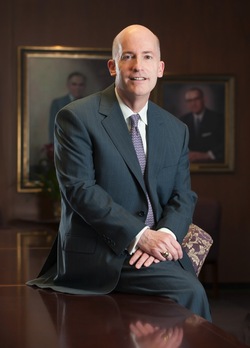
Chancellor Victor J. Boschini, Jr.
By Rick Waters
The TCU Magazine
Chancellor Victor J. Boschini, Jr. was elected to the board of directors of the American Council on Education (ACE) in March. The major coordinating body for the nation’s colleges and universities, ACE advocates on higher education issues in Washington and around the world, representing more than 1,600 institutions and 200 related associations. The council helps shape the role of higher education in the advancement of American life and competitiveness in global economy. Boschini begins a three-year term that expires in the spring of 2014. Previously, he has served as chair of the National Association of Independent Colleges and Universities (NAICU) and is a member of the Independent Colleges and Universities of Texas. We asked the chancellor about his new responsibilities and how this prestigious post might impact TCU's future.
What does this appointment mean for TCU?
Simply put, it is the recognition of TCU and its faculty and staff as being among the top academic leaders in the nation. It enables us to more effectively help influence the policies that will shape and regulate the nature of all of higher education in the months and years ahead.
What perspectives will you bring to the board that could be most beneficial to ACE?
The ACE board represents the best of every segment of higher education, from the largest research institutions to the most prestigious liberal arts colleges. We will represent the perspectives and interests of high quality private universities.
You're a past chair of the board for NAICU. How will working with the ACE board be different?
NAICU is an association of private institution presidents only. ACE is an association of presidents from the best of every kind and size of institution in America. In addition to the development of future leaders and presidents, it is the leading advocate for all of higher education in Washington.
What do you think are the most pressing concerns facing higher education as your term begins?
The most pressing concern is the impact of budget cuts on our ability to deliver quality education, but more specifically, anticipated cuts in financial aid. Access to a university education for qualified students, no matter their income, is a critical need for the future well being and economic competitiveness of our nation.
How should higher education address the growing concerns over pricing and financial aid?
Price is a function of what it costs to deliver education. It goes up because of rapid increases in the cost of utilities, ever changing technology, salaries for talented faculty and staff, complying with expanding government regulations, and so forth. And financial aid enables the discounts that make us accessible to a much wider range of qualified students. Everyone, people inside universities and outside, should contact their legislative representatives to make sure they understand this critical need.
You teach one course per academic year. This year your class explored the theme "Is higher education a driving force for positive social change in the United States?" We're turning that question back to you.
Yes, indeed it is a force for positive social change. A university education develops historical perspective, critical thinking, career knowledge, active citizens, and much more. When all of these take place simultaneously, so does positive social change. Don't forget, TCU's tag line is: "Learning to Change the World."
